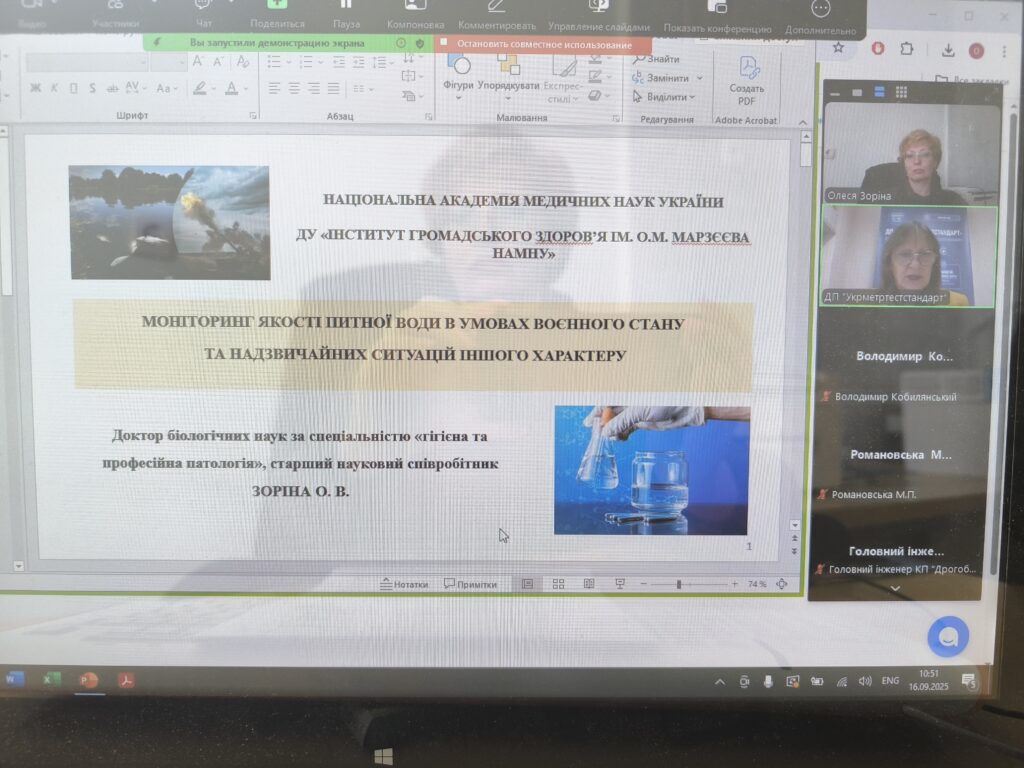On September 16, 2025, a webinar entitled «Drinking Water. Standardization. Safety and Quality Indicators» was held

On September 16, 2025, on behalf of the Ministry of Economy of Ukraine, as part of an information and awareness campaign on issues related to the activities of the State Enterprise «UKRMETRTESTSTANDART,» a webinar was held for business entities (water utilities, bottled water producers, etc.) on the topic: «Drinking water. Standardization. Safety and quality indicators.» This webinar was attended by Olesia Zorina, Doctor of Biological Sciences specializing in hygiene and occupational pathology, Senior Researcher, and Head of the Laboratory of Surface Water Safety. Her report covered issues related to the organization of monitoring in conditions of martial law and other types of emergencies, as well as issues related to the organization of laboratory research: safety indicators, operational control, and sampling. Examples of rapid analysis methods in field conditions were also provided.
Olesia Zorina drew the audience’s attention to the fact that as a result of hostilities, the risk of contamination of surface water sources is significantly increasing. This reduces the reliability of water supply and worsens access to drinking water. Therefore, in the first months of the war, DSanPiN «Safety indicators and specific quality indicators for drinking water in conditions of martial law and other emergencies» (hereinafter referred to as «DSanPiN for wartime») was developed and approved by the specialists from the State Institution «Marzieiev Institute for Public Health of the National Academy of Medical Sciences of Ukraine» and the Ministry of Health of Ukraine, based on a concept developed and scientifically substantiated by them with the aim of ensuring the sanitary and epidemiological well-being of the population.
The principle of temporary regulation of disinfection by-products in drinking water applied in the «DSanPiN for Wartime» will contribute to the spread of more effective disinfection technologies, which is a priority task in wartime. According to this document, production control of drinking water quality must comply with the requirements of DSanPiN 2.2.4-171-10 «Hygienic requirements for drinking water intended for human consumption,» which also regulates additional requirements for monitoring chemical oxygen consumption in surface water sources and risks associated with the possible use of weapons of mass destruction. It is recommended to use rapid methods and test systems to detect sudden contamination of natural and drinking water with substances or biological agents of weapons of mass destruction (water testing kit, military chemical reconnaissance kit, indicator complex for water analysis using the Colilert method, etc.).
Today, digital technologies allow data from various sources to be collected, processed, and integrated to obtain a complete picture. Devices and portable laboratories for rapid and/or automated water testing are being developed around the world. For example, sensors for river beds or drones. Such a water drone can perform on-board rapid analyses of surface water quality and algae growth at the sampling site and transmit the results to the operator’s mobile phone or computer. Portable laboratories for determining water quality based on sensor technologies can be equipped with a digital photocolorimeter, a set of laboratory glassware, dry reagents, and containers for solutions. Ukrainian developers of such portable laboratories guarantee the study of sanitary and chemical indicators with high accuracy of the results obtained.
After her presentation, Olesia Zorina, as an expert on international projects for the implementation of the requirements of Directive 2020/2184/EU on drinking water in Ukraine, answered questions about the problems encountered during the implementation of European legislation on drinking water, as well as methods of purifying water from phytoplankton, etc.
(date of publication on the website 16.09.2025)